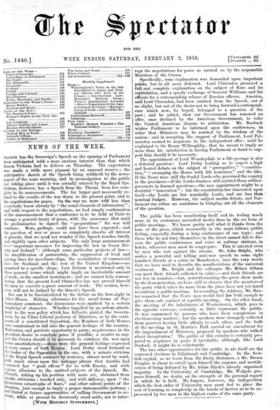The public has been manifesting itself and its feeling much
more in its customary unstudied modes than in the set form of public meetings. We know pretty well what it thinks from the tone of the press, which necessarily in the main follows public feeling, especially during a long continuance of one topic ; and those who do not bury themselves in the closet cannot fail to dis- cern the public countenance and voice at railway stations, in hotels, wherever men most do congregate. This is attested even by men who row against the stream. Mr. John Bright, who • makes a powerful and telling anti-war speech to • some eight hundred friends at a soirée in' Manchester, uses the very words that we have used to describe the manifestations of the universal sentiment. Mr. Bright and his colleague Mr. Milner Gibson can meet their friends collected in soiree,—and their friends are not few in number,—but, notwithstanding the great show made by the demonstration, we have still to observe that the members of the party which takes its name from the place have not yet dared ,
to confront a public meeting. In secondine.D the Address, Mr. Bax- ter remarked that the Peace men would find few bold enough to
give them safe conduct at a public meeting. On the other hand, the meeting of the inhabitants of Westminster, which goes to the opposite extreme, certainly as little represents the public.
It was summoned by persons who have been conspicuous in electioneering matters ; but the speakers were strangely collected from quarters having little affinity to each other, and the bulk of the meeting in St. Martin's Hall carried an amendment for the impeachment of Ministers, proposed by speakers who talked about decapitation ! The public of this country is certainly pre- pared to acquiesce in peace if inevitable, although, like Lord Gosford, it might do so reluctantly.
The two other opportunities for the public to air itself are the contested elections in Edinburgh and Cambridge. In the Scot- tish capital, as we learn from the Daily Scotsman, a Mr. Brown Douglas is about to entail upon himself the expense and mortifi- cation of being defeated by Mr. Adam Black's already organized majority. In the University of Cambridge, Mr. Walpole pro- poses himself, no doubt, on the strength of the personal regard in which he is held. He forgets, however, the indisposition which the best order of University men must feel to place the seat of learning so completely in the hands of faction as to be re- presented by two men in the highest ranks of the same party.










































